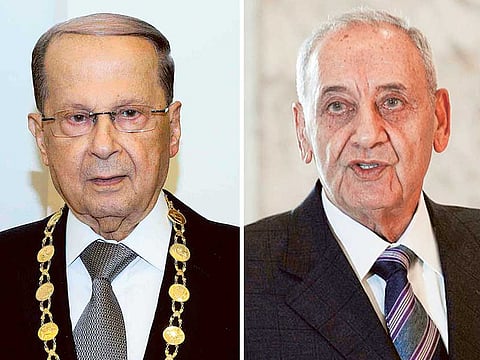Aoun, Berri tiff could delay cabinet formation
Aoun blamed Berri for extending parliament terms and weakening the state

Beirut: President Michel Aoun and Parliament Speaker Nabih Berri exchanged bitter criticisms less than two weeks after the election of the head of state, in a move that could set back efforts to form a new government before the scheduled November 22 Independence Day celebrations.
The exchanges reflected existing tensions between the two leaders who have a long history of hostility.
The tiff arose when Aoun, speaking to Christian religious figures assembled at the Seat of the Maronite Church at Bkirki, lamented the fact that Parliament’s term had been extended twice in 2013 and 2014 against the will of the Free Patriotic Movement [FPM].
“All state institutions were weakened because of the extension of Parliament’s term and the inability of the governing body to act,” he said — implying Berri was to blame.
The latter did not hesitate to hit back hard as he blamed the FPM founder for the 29-month presidential vacuum, which paralysed the legislature and crippled the government’s work.
Berri opposed Aoun’s presidential nomination and cast a blank ballot along with his 13-member Amal Party deputies on October 31.
He nevertheless congratulated the president and was designated by Hezbollah to represent and defend Shiite positions in the formation of a new government after Sa‘ad Hariri was nominated to be the new premier.
Meanwhile, top Maronite and Shiite spiritual leaders quickly rushed to defend their co-religionists and attack the other, giving the spat a dangerous sectarian tinge.
Cardinal Mar Bisharah Al Ra‘i, the head of the Maronite Church, objected moves to allocate the Ministry of Finance to the Amal Party and for Hezbollah to veto granting the Christian-party Lebanese Forces any “sovereign” ministerial portfolio. This triggered a quick response from Shaikh Abdul Amir Qabalan, the vice-president of the Higher Islamic Shiite Council, who declared: “The Shiites were and always will be the keenest for a just and equally representative state.”
Hariri faced an uphill challenge to form a new government because most parliamentary blocs and parties who cut deals with him and with Aoun expected to be rewarded.
A sustained competition by various blocs to land the Public Works, Telecommunications and Energy ministries, among others, is under way, given available options for financial windfalls.



